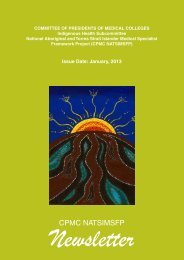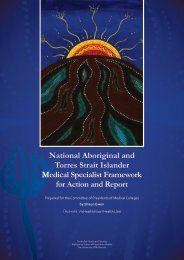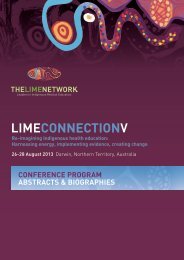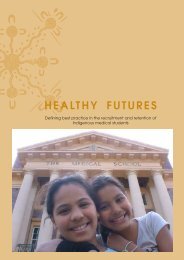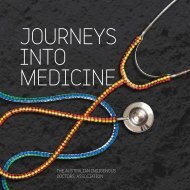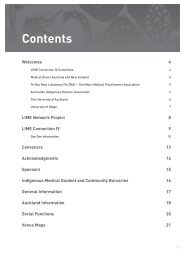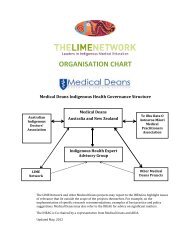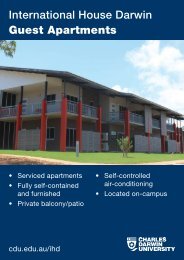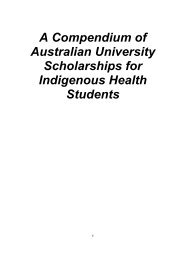abstracts and bios cover_final.indd - LIME Network
abstracts and bios cover_final.indd - LIME Network
abstracts and bios cover_final.indd - LIME Network
You also want an ePaper? Increase the reach of your titles
YUMPU automatically turns print PDFs into web optimized ePapers that Google loves.
Keynote Presenters <strong>and</strong> Discussants:Thursday 3 DecemberNgangkari Traditional HealersMr Andy Tjilari, Mr Toby Ginger, Mr Rupert PeterAndy, Toby <strong>and</strong> Rupert were born in the busharound 1940, in the far northwest cornerof South Australia, near where the bordersof South Australia, Western Australia <strong>and</strong>the Northern Territory meet. They lived atraditional life with their families until theestablishment of the first Mission in the areain Ernabella SA. Andy was one of the firstchildren to attend Ernabella School.Andy, Toby <strong>and</strong> Rupert began to learn the skills of the ngangkari (traditional healer) as young children in thebush. Their gr<strong>and</strong>fathers gave them sacred tools <strong>and</strong> special powers, <strong>and</strong> trained them over many years.Andy, Toby <strong>and</strong> Rupert continue this tradition today with their own gr<strong>and</strong>children.Rupert, Andy, <strong>and</strong> more recently Toby, work for NPY Women’s Council (NPYWC) Ngangkari Project, funded byCountry Health SA. NPYWC’s region <strong>cover</strong>s 350,000 square kilometres of the remote tri-State cross-borderarea. Anangu <strong>and</strong> Yarnangu (Aboriginal people) living on the Ngaanyatjarra, Pitjantjatjara <strong>and</strong> Yankunytjatjaral<strong>and</strong>s share strong cultural <strong>and</strong> family affiliations. NPYWC began as an advocacy organisation but is now alsoa major provider of human services in the region.Andy, Rupert <strong>and</strong> Toby provide ngangkari treatments to anangu (Indigenous people) in remote communitiesin this region, as well as those in hospitals, jails, nursing homes <strong>and</strong> hostels in regional centres. Their workis highly valued <strong>and</strong> the service is in great dem<strong>and</strong>. The ngangkari believe that better health outcomes forIndigenous people can be achieved by ngangkari <strong>and</strong> western medicine working together <strong>and</strong> to this end theyare committed to educating health workers about traditional healing practices. Andy, Toby <strong>and</strong> Rupert areaccomplished public speakers who are authorised to speak publicly about traditional anangu culture <strong>and</strong>ngangkari practices. They have travelled across Australia <strong>and</strong> overseas addressing forums about the valueof traditional healing <strong>and</strong> medicines, <strong>and</strong> also meet regularly with staff of Central Australian health services.They have received many accolades, the most recent being the Mark Sheldon Prize for 2009 awarded by theRoyal Australian <strong>and</strong> New Zeal<strong>and</strong> College of Psychiatry (RANZCP), <strong>and</strong> the 2009 Dr Margaret Tobin Award forexcellence in the provision of mental health services to those most in need.In 2000 a group of over 50 ngangkari in Central Australia met <strong>and</strong> decided they would tell their stories as anattempt to educate non-Indigenous health workers about the importance <strong>and</strong> value of ngangkari, with the aimof encouraging greater collaboration <strong>and</strong> underst<strong>and</strong>ing within the mainstream health system. NPY Women’sCouncil has published a book of their stories called “Ngangkari Work Anangu Way”. A new edition of this bookis planned for 2010.22



